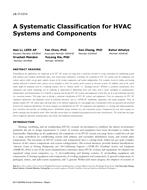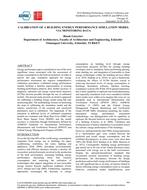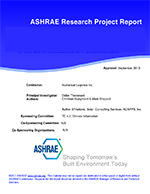Click here to purchase
Nanolubricants, that is, nanoparticles dispersed in the non-volatile component of a refrigerant and oil mixture, have shown potential to augment heattransfer in the evaporators of refrigeration systems. The two-phase flow boiling heat transfer coefficient superposition models, available in the literature, usedDittus-Boelter or Gnielinski correlations to predict convective heat transfer rates, and Forster-Zuber or Cooper correlations to estimate the nucleate boilingheat transfer rates. These correlations do not account for the presence of nanoparticles in the two-phase flow and cannot predict the heat transfer enhancements,or sometimes degradation, observed during flow boiling experiments of refrigerant and nanoparticle laden lubricant mixtures. A new comprehensive modelwas developed by modifying and integrating existing convective heat transfer models originally developed for nanofluids and pool boiling models fornanolubricants. The newly developed model accounts for the interactions of nanoparticles with the base fluids in terms of increasing the heat transfer bytransfer of momentum from the nanoparticles to the bubbles, and introducing slip velocity effects at the interface between the nanoparticles and the base fluid.Experimental heat transfer data of the saturated two-phase flow boiling of R410A with two nanolubricants in a smooth copper tube were used to validatethe new superposition model. The two nanolubricants had non-spherical ZnO nanoparticles and spherical γ-Al2O3 nanoparticles dispersed in Polyolester(POE) lubricant. The model results followed the data trends and confirmed that the presence of low concentrations of nanoparticles in the turbulent flowincreased the laminar sublayer thickness. This phenomenon was responsible for the observed decrease of the two-phase flow evaporative heat transfer.However, the model predicted potential enhancements in heat transfer when constraining the nanoparticles within the laminar sublayer of the flow.
Citation: 2020 Winter Conference, Orlando, FL Conference Papers
Product Details
- Published:
- 2020
- Number of Pages:
- 10
- Units of Measure:
- Dual
- File Size:
- 1 file , 1.2 MB
- Product Code(s):
- D-OR-20-C017


